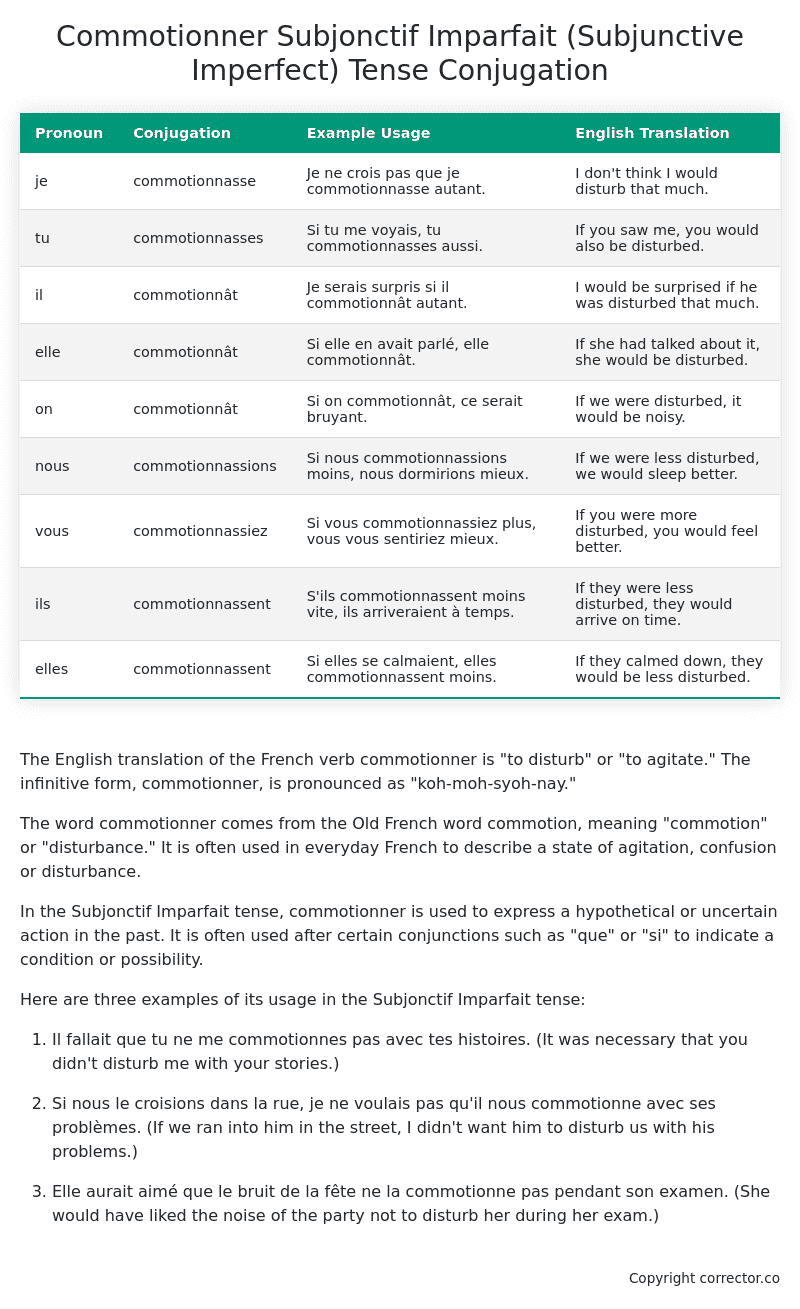Subjonctif Imparfait (Subjunctive Imperfect) Tense Conjugation of the French Verb commotionner
Introduction to the verb commotionner
The English translation of the French verb commotionner is “to disturb” or “to agitate.” The infinitive form, commotionner, is pronounced as “koh-moh-syoh-nay.”
The word commotionner comes from the Old French word commotion, meaning “commotion” or “disturbance.” It is often used in everyday French to describe a state of agitation, confusion or disturbance.
In the Subjonctif Imparfait tense, commotionner is used to express a hypothetical or uncertain action in the past. It is often used after certain conjunctions such as “que” or “si” to indicate a condition or possibility.
Here are three examples of its usage in the Subjonctif Imparfait tense:
-
Il fallait que tu ne me commotionnes pas avec tes histoires. (It was necessary that you didn’t disturb me with your stories.)
-
Si nous le croisions dans la rue, je ne voulais pas qu’il nous commotionne avec ses problèmes. (If we ran into him in the street, I didn’t want him to disturb us with his problems.)
-
Elle aurait aimé que le bruit de la fête ne la commotionne pas pendant son examen. (She would have liked the noise of the party not to disturb her during her exam.)
Table of the Subjonctif Imparfait (Subjunctive Imperfect) Tense Conjugation of commotionner
| Pronoun | Conjugation | Example Usage | English Translation |
|---|---|---|---|
| je | commotionnasse | Je ne crois pas que je commotionnasse autant. | I don’t think I would disturb that much. |
| tu | commotionnasses | Si tu me voyais, tu commotionnasses aussi. | If you saw me, you would also be disturbed. |
| il | commotionnât | Je serais surpris si il commotionnât autant. | I would be surprised if he was disturbed that much. |
| elle | commotionnât | Si elle en avait parlé, elle commotionnât. | If she had talked about it, she would be disturbed. |
| on | commotionnât | Si on commotionnât, ce serait bruyant. | If we were disturbed, it would be noisy. |
| nous | commotionnassions | Si nous commotionnassions moins, nous dormirions mieux. | If we were less disturbed, we would sleep better. |
| vous | commotionnassiez | Si vous commotionnassiez plus, vous vous sentiriez mieux. | If you were more disturbed, you would feel better. |
| ils | commotionnassent | S’ils commotionnassent moins vite, ils arriveraient à temps. | If they were less disturbed, they would arrive on time. |
| elles | commotionnassent | Si elles se calmaient, elles commotionnassent moins. | If they calmed down, they would be less disturbed. |
Other Conjugations for Commotionner.
Le Present (Present Tense) Conjugation of the French Verb commotionner
Imparfait (Imperfect) Tense Conjugation of the French Verb commotionner
Passé Simple (Simple Past) Tense Conjugation of the French Verb commotionner
Passé Composé (Present Perfect) Tense Conjugation of the French Verb commotionner
Futur Simple (Simple Future) Tense Conjugation of the French Verb commotionner
Futur Proche (Near Future) Tense Conjugation of the French Verb commotionner
Plus-que-parfait (Pluperfect) Tense Conjugation of the French Verb commotionner
Passé Antérieur (Past Anterior) Tense Conjugation of the French Verb commotionner
Futur Antérieur (Future Anterior) Tense Conjugation of the French Verb commotionner
Subjonctif Présent (Subjunctive Present) Tense Conjugation of the French Verb commotionner
Subjonctif Passé (Subjunctive Past) Tense Conjugation of the French Verb commotionner
Subjonctif Imparfait (Subjunctive Imperfect) Tense Conjugation of the French Verb commotionner (this article)
Conditionnel Présent (Conditional Present) Tense Conjugation of the French Verb commotionner
Conditionnel Passé (Conditional Past) Tense Conjugation of the French Verb commotionner
L’impératif Présent (Imperative Present) Tense Conjugation of the French Verb commotionner
L’infinitif Présent (Infinitive Present) Tense Conjugation of the French Verb commotionner
Struggling with French verbs or the language in general? Why not use our free French Grammar Checker – no registration required!
Get a FREE Download Study Sheet of this Conjugation 🔥
Simply right click the image below, click “save image” and get your free reference for the commotionner Subjonctif Imparfait tense conjugation!

Commotionner – About the French Subjonctif Imparfait (Subjunctive Imperfect) Tense
Formation
Common Everyday Usage Patterns
Interactions with Other Tenses
Subjonctif Présent
Indicatif Passé Composé
Conditional
Conditional Perfect
Summary
I hope you enjoyed this article on the verb commotionner. Still in a learning mood? Check out another TOTALLY random French verb conjugation!


